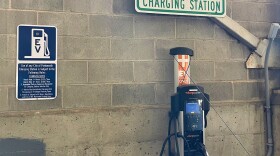Hurricane Harvey slammed the Gulf Coast last week, and it got us thinking: How ready is New Hampshire for major storms, hurricanes, and floods?
Perry Plummer, Director of the Division of Homeland Security and Emergency Management for the New Hampshire Department of Safety, says the state has plenty of work to do to ensure our infrastructure can handle the kind of extreme weather events that are becoming increasingly common.
"We know more water is coming; we’re going to get these types of rain storms," Plummer said on The Exchange. "Obviously, I don’t think we’ll get a Harvey in New Hampshire, but we are going to get 10 and 15 inches of rain, and that’s going to challenge our infrastructure. We need to rebuild our infrastructure to protect our residents, protect our critical infrastructure."
Plummer said that immediate response to a disaster -- dramatic rescues, for instance -- get far more attention than recovery, when the painstaking work of rebuilding begins.
"We're just closing out one of our disaster grants on a project that happened in Irene in 2011," he said. "Hurricane/tropical storm Irene in 2011 dropped seven inches of rain. We’re just taking care of one of those projects right now. We have about nine open disasters right now that we’re in the recovery phase with."
With these extreme weather events in mind, Plummer urges all Granite Staters to keep 72 hours' worth of food, water, and emergency provisions on hand.
Listen to the full conversation:
GUESTS:
- Jim Gallagher - Chief engineer of the Dam Bureau of the New Hampshire Department of Environmental Services.
- Fred McNeill - Chief engineer at the Environmental Protection Division in Manchester, where he works with wastewater.
- Perry Plummer - Director of the Division of Homeland Security and Emergency Management for the New Hampshire Department of Safety.
- Jonathan Winter - Assistant professor of geography at Dartmouth College.








